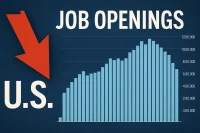A federal judge in Pennsylvania has denied a request to block the Federal Trade Commission’s new ban on noncompete agreements.
It cleared a significant hurdle for the rule scheduled to take effect on September 4.
The FTC’s ban aims to eliminate noncompete clauses.
It restricts employees from changing jobs within the same industry and affects around 20 percent of American workers.
This decision comes amid legal challenges from various business groups who argue that the ban undermines their ability to protect trade secrets and confidential information.
ATS Tree Services, one of the plaintiffs, argues noncompete agreements were crucial for protecting specialized training and sensitive company information.
However, Judge Kelley Brisbon Hodge ruled ATS did not demonstrate that it would suffer irreparable harm from the rule and deemed the lawsuit unlikely to succeed.
FTC spokesman Douglas Farrar hailed the decision as a victory for the agency’s authority.
He said said noncompete clauses stifle competition and economic growth.
Josh Robbins, a lawyer for ATS from the Pacific Legal Foundation, said the firm was disappointed by the court ruling.
He said the company would “continue to fight the F.T.C.’s power grab.”
However, he did not confirm whether an appeal would be pursued.
Need Career Advice? Get employment skills advice at all levels of your career
Meanwhile, the legal landscape remains unsettled as employers await a ruling from Judge Ada Brown of the US District Court for the Northern District of Texas.
Judge Brown recently issued a preliminary injunction in a separate case involving the US Chamber of Commerce.
It suggested that the FTC may lack the authority to impose the rule, indicating the plaintiffs will likely succeed in their challenge.
Judge Brown expects to deliver a final decision by the end of August.
The lawsuits against the FTC contend that the ban was implemented without proper constitutional and statutory authority.
The FTC, backed by its three Democratic commissioners, argues that the rule is within the scope of its powers under the FTC Act of 1914.




